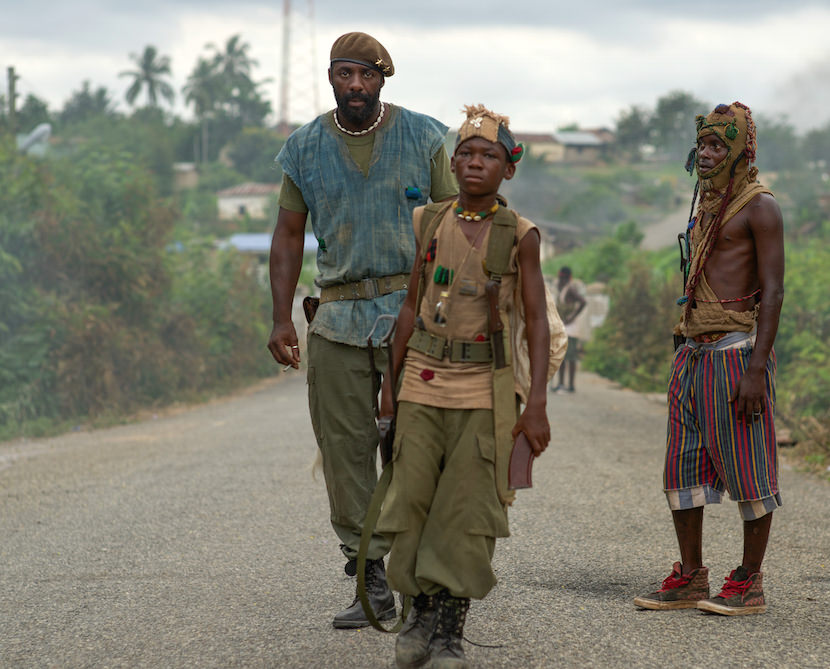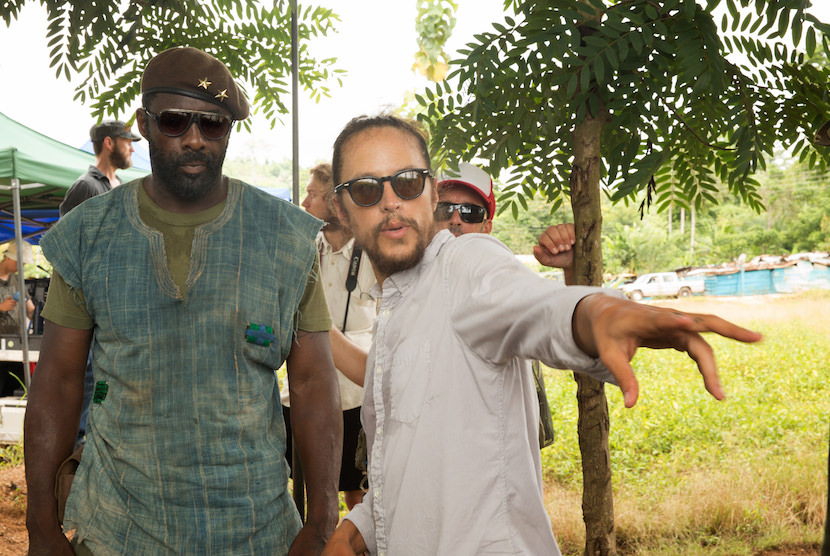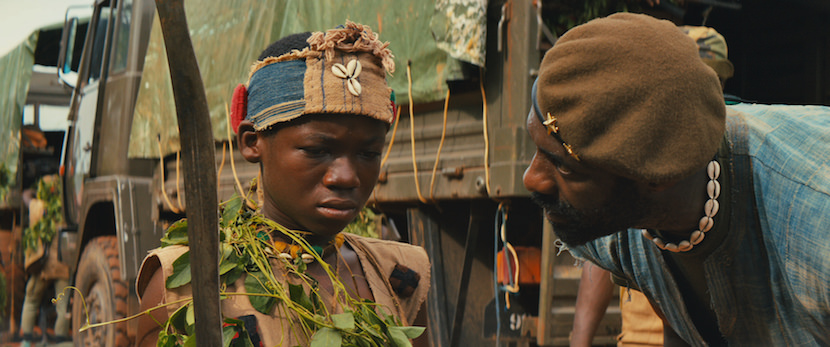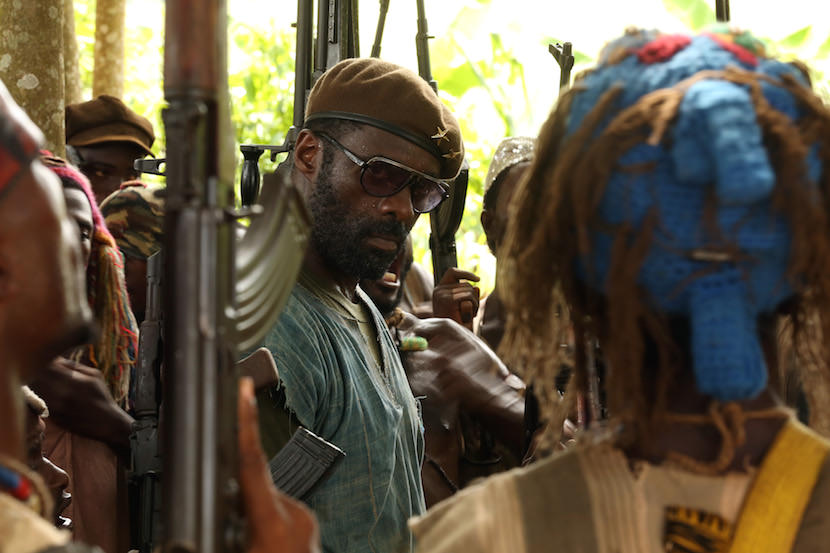Director Cary Fukunaga on Filming the Haunting Beasts of No Nation
Although he's probably best known for directing the first season of True Detective, Cary Fukunaga is most likely to be found making movies on the front lines of contemporary conflicts. The California-bred Japanese-American filmmaker's first feature, Sin Nombre, chronicled the quest of Central American immigrants to reach the United States. His latest is Beasts of No Nation, set during a civil war in an unnamed West African country, and filmed under arduous circumstances in Ghana.
Beasts has attracted attention for its unflinching depiction of child soldiers, led by a self-serving commander played by Idris Elba, a British actor whose mother came from Ghana. Another talking point is that Beasts is the first theatrical release from Netflix, which will open the movie on 29 screens on Oct. 16, the same day it debuts on the streaming service.

Long before concluding that unprecedented deal, Fukunaga began a script about war in Africa. Eventually, he turned to the novel by Nigerian-American author Uzodinma Iweala, who Fukunaga calls "Uzo." In a recent interview with The Credits, which was edited for length and clarity, the filmmaker explained how his original screenplay yielded to an adaptation.
"I was looking to write an original story about war in Sierra Leone. Conflict diamonds, child soldiers. But after about five or six years of slow research, because I was doing other things at the same time, a friend of mine gave me the book. It made all my other work feel sort of useless. It was so much better. So much more contained, and emotionally effective. All the research I'd done, I could place in
that world and still say faithful to Uzo's text."

While making the movie, you contracted malaria at the beginning of the shoot. Then you had to take on the cinematographer's job when the original camera operator pulled his hamstring on the first day of filming. Elba slipped and fell off a 90-foot cliff, his life saved only by landing on a ridge. And those are just a few of the problems the production encountered.
There was not one easy part of the process. Sometimes it felt like we were cursed. In pre-production, it quickly became clear that everything we'd been promised wasn't a guarantee. The stuff we needed as essentials wasn't guaranteed, either. We didn't know if we were going to have weapons for the movie; we thought we might have to fashion them out of wood a week and half before production. We were wondering how we were going to populate the film with actors when some of our actors were being held in a prison in Ivory Coast. Getting food to the crew could take a whole day.
The things you would take for granted didn't get done. The reason is that the Ghanians are such kind and polite people, and often times "no" is not culturally acceptable. When you ask for something, they'll say, "Yes." "Can you get this?" "Yes." "Can it be here by Thursday?" "Yes." In actuality, it's never going to happen. When you start to learn about that, you tend to supervise every little detail. So getting pencil sharpeners for the pencils is getting as much attention as getting ammunition in through customs. Everything just slows to a halt.
The cultural inability to say "no" sounds like the Japanese.
Very similar. There's a very Japanese way of saying no, which is, "Yes, but it's very difficult." At which point you're supposed to say, "Ah, OK. We'll figure something else out."
But it was important to film in West Africa? You didn't think, "Well, Louisiana wouldn't be so bad."
Uzo and I really wanted to keep it West African. There was a point where South Africa was really being pushed hard. We looked at Nigerian populations in South Africa to see if we could recreate something that looks like Nigeria. Then Kenya got thrown out there because I'd done a couple shoots in Kenya. Then Uganda, because it's right next to Kenya and we could have all the production services from Kenya. Through it all, in my gut, I felt like we had to shoot it in West Africa. It's definitely a West Africa story.
There is a sort of West African identity, despite all the differences. All the allegories and fables are about the jungle and overgrowth, the renewal and cycles. So all that lends to the kind of stories you can tell there. And this one in particular is about cycles, and fathers and sons. And rebirth.

Did you always intend to work primarily with nonprofessional actors?
Yeah. There are lots of West African actors working in France and Hollywood and the U.K., but it would have been very expensive to fly all those people down there. It made more sense to cast in Ghana.
Did you have a strategy for directing them?
The main strategy is just to try to cast somebody who gets it. Somebody who can do the role. I didn't care if they'd done nothing before. I just cared that they seemed believable.
On the set, what did you do keep the actors in the moment?
We'd do long takes, or just not cut. Or roll without telling people we're rolling, and just have stuff start moving. Sometimes it's just repetition. Until people start to get what we're trying to do.
The training of our extras was a separate thing. Getting them to understand how to move from point A to point B and not to laugh. We used the same extras over and over again, so they could make background and not break the suspension of disbelief.
Did you use Elba as a sort of on-camera leader?
Yeah. Well, really a commander shouldn't have to do the yelling. He has people around him who yell for him. To have to raise your voice, you lose respect in that culture. Every once in a while, he would try to keep people quiet when everyone was talking, but for the most part he just stayed in character in the sense that he wasn't trying to be friends with his grunts. He had his bodyguards and his lieutenants and those are the people he would speak to.

This is a violent film about a brutal subject. Did you always know where the line was between what you should and shouldn't show? Or did you rethink it as you went?
Some as we shot, some in post-production. When I made Sin Nombre, we didn't see it with an audience until it was being projected for the first time in Sundance. It wasn't until that screening that I realized how violent the movie was. Not that I'd become numb to it. It just didn't really dawn on me.
I think it's like comedy. You hear a joke over and over again, and it stops being funny. While you're writing it, it's very effective, but then once you start shooting the components, it's a different thing. And when you edit it together, and you're just trying to make the timing work, the experience of it is something else entirely. To be able to experience it as if you never had before is impossible.
The structure of this film is difficult, because the third act has to slow down and change gears. Up until that part, it's been an adrenaline-filled ride. So trying to not actually exhaust the audience was something we were keenly aware of.
The violence you show or don't show isn't always based on taste. It's based on practicality. You can't always show people being hurt because to do it effectively involves stunts and makeup and a lot of other things. In the case of hacking somebody to death with a machete, it requires a body. The benefit of keeping things off-camera is that it's then in the imagination of the viewer. And the viewer can project far more gruesome images than I could show.
In addition to Sin Nombre and Beasts, you made Jane Eyre. Do you see themes that run through all three?
Not really. I've joked before about certain things, but in actuality there's really not one thing that they all have in common. But also, I try not to think about it, because my job is not really to analyze my own work in that sense. It's just to do whatever fires me up, and to do that as well as possible.
What brought me to Sin Nombre was a story of a refrigerator trailer full of immigrants that had no air circulation. And other stories I'm working on come from reading nonfiction material. My interest in child soldiers just came from about reading about it. When I feel something when I'm reading about real subjects, I feel compelled to learn more about it. And naturally, because my trade is filmmaking, I think, "Could this be a story that I could make into a movie?" But I don't really think about it in terms of the connections between the material.
The films are all versions of me, based on the characters that I'm writing in them. But I wouldn't say that they're part of a body of work that has that kind of unity.
You say they're all you because you write them all. But do you think of them as being you before you start writing?
No. They become me just based on my presence in it. Writing the characters, putting it into words, pulling from my own experiences to try to figure out how these people speak, or interact with each other. Just as far as that.
Do you always want to leave your comfort zone, to explore places where people have it harder?
My mom told me once that when I was 4 or 5 years old, I'd come home from preschool and watch the 5 o'clock news. At the time, Beirut was a big headline. I remember watching the U.S. Marine base being overrun and things like that. And I remember telling my mom, when she was going to go on vacation, "Don't go to Beirut."
So my eyes have always been abroad. The interconnectedness of the world, more than anything. Connections do interest me in that sense. That's why I studied history, and ended up studying international relations. I like seeing how much we all have in common. All I wanted to do when I finished high school was travel. I didn't want to go to college. Experiencing, rather than just reading about stuff.
My movies then weren't stories about young-adult relationships, taking place in cafes at home. They were always stories that took place in far away places where it would be hard to shoot. One of the first films I ever wrote was about a town overrun during the war in Sierra Leone. I've never looked at home, for some reason. I've always looked out.
Beasts is Netflix's first theatrical feature. Are you content, if not perhaps happy, that it's going to go mostly to people's TVs and computer screens?
I know specifically for Sin Nombre that most people experienced it at home. So I'm already familiar with the idea of people's not experiencing the movie in a cinema. Of course I want it to live in a cinema as long as possible. But if Beasts of No Nation had been a typical platform release, would people have talked about it? Would it have gone into the Venice Film Festival, even, if Netflix weren't involved?
Theater distribution was non-negotiable for me. That had to happen. I wasn't going to make any deal anywhere unless we screening this film in a theater as it was meant to be experienced. Netflix was very supportive of that. It's outside what Netflix has done before, but it made a lot of sense in terms of their wanting to be involved in original filmmaking.
Netflix makes it possible for more people to enjoy the film. And that's ultimately what you want. Yes, I want the big screen. But between big screen and no one watching it, that's a no-brainer.
Featured image: Idris Elba in the Netflix original film "Beasts of No Nation" Photo Courtesy Netflix


